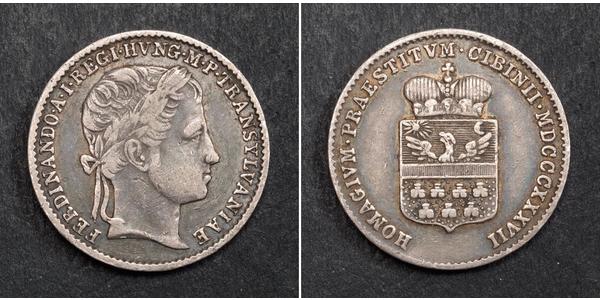(sold for $67.0)
1837, Austria/Romania, Ferdinand I. Silver Homage in Sibiu (Transylvania) Medal.
Mint Year: 1837 Reference: Nov. E3b. Condition: A nicely toned about XF! Denomination: Medal - Homage in Sibiu, Transylvania (located in today´s Romania) during 1837. Diameter: 18mm Weight: 3.27gm Material: Silver
Obverse: Laureate head of Ferdinand I right. Legend: FERDINANDO . A . I . REGI . HVNG . M . P . TRANSYLVANIAE Reverse: Ducal crown on coat-oof-arms of the Grand Principality of Transylvania Transylvania (Siebenbürgen). Legend: HOMAGIVM . PRAESTITVM . CIBINII . MDCCCXXXVII
The Principality of Transylvania, from 1765 the Grand Principality of Transylvania, was a realm of the Hungarian Crown and from 1804 an Austrian crownland ruled by the Habsburg and Habsburg-Lorraine monarchs of the Habsburg Monarchy (later Austrian Empire). During the Hungarian Revolution of 1848, the Hungarian government proclaimed union with Transylvania in the April Laws of 1848 (after the Transylvanian Diet's confirmation on 30 May and the king's approval on 10 June that Transylvania again become an integral part of Hungary). After the failure of the revolution, the March Constitution of Austria decreed that the Principality of Transylvania be a separate crown land entirely independent of Hungary. In 1867, as a result of the Austro-Hungarian Compromise, the principality was reunited with Hungary proper.
Sibiu (German: Hermannstadt, Hungarian: Nagyszeben) is a city in Transylvania, a historical region of Romania. Located some 275 km (171 mi) north-west of Bucharest, the city straddles the Cibin River, a tributary of the river Olt. Now the capital of the Sibiu County, between 1692 and 1791 and 1849–65 Sibiu was also the capital of the Principality of Transylvania. Nicknamed The City with Eyes, the city is a well-known tourist destination for both domestic and foreign visitors. Known for its culture, history, gastronomy and its diverse architecture, which includes its much iconic houses with eyes that gave Sibiu its nickname, the city has been getting much attention since the beginning of the 21st century. In 2004, its historical center has begun the process of becoming a UNESCO World Heritage Site. Sibiu was designated the European Capital of Culture in 2007. One year later, it was ranked "Europe's 8th-most idyllic place to live" by Forbes. In 2019, Sibiu was named the European Region of Gastronomy, while in 2020 it was designated "Europe's sixth best tourist destination". Sibiu will host the European Wandering Capital event in 2021, the most important tourist wandering event in Europe. A European Union summit was hosted by the city in 2019. Sibiu is also known for its Christmas market. The pioneers of rocketry Conrad Haas and Hermann Oberth were from Sibiu. As of 2011, the city has a population of 147,245, while a 2019 estimate puts it at 169,056. The proposed Sibiu metropolitan area has a population of 267,170. The city also administers the village of Păltiniș, a ski resort located 35 kilometres to the south. Historically, Sibiu has been one of the most important centres of the Transylvanian Saxons. It is called Härmeschtat in their dialect.
Ferdinand I, Emperor of Austria, King of Hungary and Bohemia (April 19, 1793 – June 29, 1875) succeeded his father (Franz II Holy Roman Emperor/Franz I of Austria) as emperor and king (as Ferdinand V) in 1835. He chose to abdicate, after a series of revolts in 1848. He was also King of Lombardy-Venetia.
Ferdinand has been depicted as feeble-minded and incapable of ruling, but although he was epileptic and certainly not intelligent, he kept a coherent and legible diary and has even been said to have a sharp wit. The up to twenty seizures he had per day, though, severely restricted his ability to rule with any effectiveness.
Though he was not declared incapacitated, a regent's council (Archduke Luis, Count Kolowrat and Prince Metternich) steered the government. His marriage to Princess Maria Anna of Sardinia (1803-1884) was probably never consummated, nor is he believed to have had any other liaisons. He is famous for his one coherent command: when his cook told him he could not have apricot dumplings because they were out of season, he said "I'm the Emperor, and I want dumplings!" (German: Ich bin der Kaiser und ich will Knödel.)
As the revolutionaries of 1848 were marching on the palace, he is supposed to have asked Metternich for an explanation. When Metternich answered that they were making a revolution, Ferdinand is supposed to have said "But are they allowed to do that?" (Viennese German: Ja, dürfen's denn des?) He was convinced by Felix zu Schwarzenberg to abdicate in favour of his nephew, Franz Joseph (the next in line was Ferdinand's younger brother Franz Karl, but he was persuaded to waive his succession rights in favour of his son) who would occupy the Austrian throne for the next sixty-eight years.
Ferdinand recorded the events in his diary : "The affair ended with the new Emperor kneeling before his old Emperor and Lord, that is to say, me, and asking for a blessing, which I gave him, laying both hands on his head and making the sign of the Holy Cross ... then I embraced him and kissed our new master, and then we went to our room. Afterward I and my dear wife heard Holy Mass ... After that I and my dear wife packed our bags"
Ferdinand was the last King of Bohemia to be crowned as such. Due to his sympathy with Bohemia (where he spent the rest of his life in Prague Castle) he was given the Czech nickname "Ferdinand V, the Good" (Ferdinand Dobrotivý). In Austria, Ferdinand was similarly nicknamed "Ferdinand der Gütige" (Ferdinand the Benign), but also ridiculed as "Gütinand der Fertige" (Goodinand the Finished).
He is interred in tomb number 62 in the Imperial Crypt in Vienna.
Only 1$ shipping for each additional item purchased!

|
Posted by:
anonymous 2020-11-27 |













